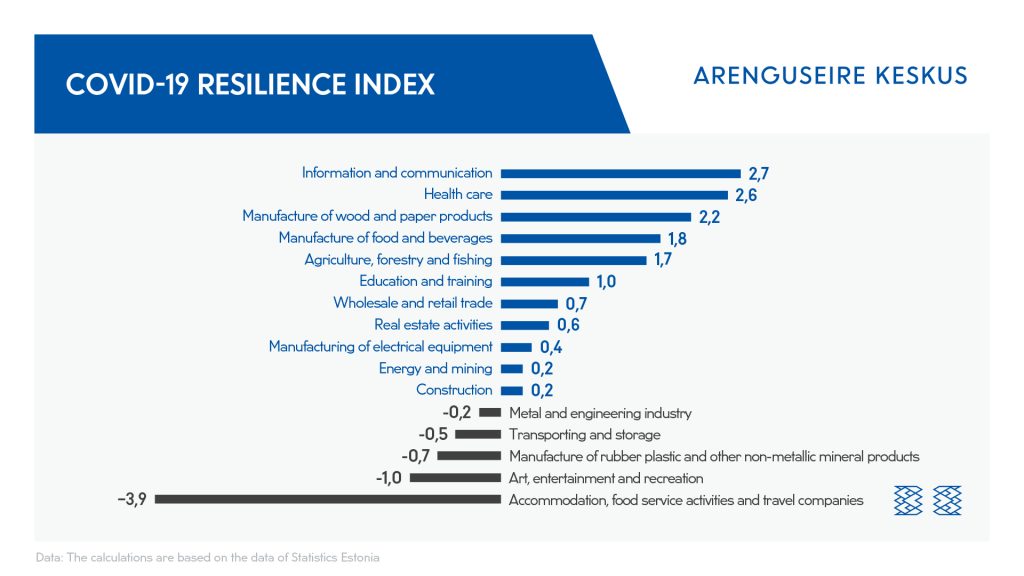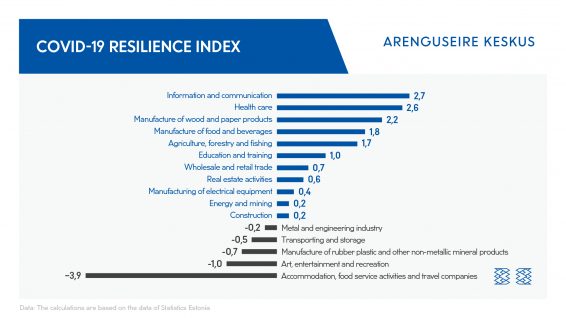Estonian wood and paper industry resists the virus crisis well
The Estonian wood and paper industry resisted the economic impacts of the first wave of the coronavirus better than the average, the Foresight Centre report “The Impact of Virus Crisis on the Estonian Economy” shows. The turnovers of the industry started to recover already in June.

“While the Estonian economy as a whole faces the second wave of the coronavirus in a relatively vulnerable state, the wood and paper industry has turned out to be more virus-proof than the average,” expert of the Foresight Centre Uku Varblane said. “The Estonian wood industry has resisted the crisis mainly due to the stable and growing demand for wood-based materials, as well as its high level of automation. The wood industry is one of the economic sectors that will help Estonia overcome the crisis in the coming years,” he added.
Varblane thinks that the development of wood chemistry, which enables to create products of greater value from domestic wood and broaden the possibilities of the use of timber, will provide new opportunities for the sector. “Tightening environmental requirements will bring about increase in the use of wood-based materials in construction, in packaging, in the textile industry, and also in the pharmaceutical industry and elsewhere,” Varblane said.
One of the factors relating to the virus crisis that may start to hinder the development of the wood industry is the restrictions on mobility between countries in the coming years. “Although efforts for automation are made in the industry, rapid reduction of human labour is not possible in all segments of work,” Varblane said. “For example, furniture production depends on foreign labour because specialists with suitable wage level cannot be found in Estonia.”
If the movement between states is restricted, the entry of the maintenance teams of the equipment used in the wood industry and the installation of wooden houses produced in Estonia in other countries will remain a problem.
3.7% of all workers or around 20,000 workers are employed in wood and paper industry, and 3.1% of the added value of the whole economy (769.2 million euro in current prices) was generated in the sector in 2019.
Due to the virus crisis, the monthly turnover of the wood industry decreased by up to 5.9% in April in comparison to the previous year but reached an increase of 3.8% in comparison to the previous year in June. The largest decrease in turnover relating to the virus crisis in the paper industry was in May when the monthly turnover was 14.4% lower than in the previous year.
According to the COVID-19 resilience index developed by the Foresight Centre, the wood and paper industry ranks third (2.2 points) by resilience to the crisis among the 17 economic sectors.
COVID-19 RESILIENCE INDEX
The COVID-19 resilience index measures the extent to which economic sectors are affected by the coronavirus crisis. The index is based on various economic indicators of companies. The value of the index is between -5 (the largest negative impact) and +5 (the smallest negative impact). The index takes into account the changes in the turnover of companies (total turnover in March–August 2020 compared with the same period the year before) in the economic sector, changes in their number of employees in comparison to 2019 and the dynamics after the emergency situation, changes in labour expenses, and changes in the profit and investments of companies in comparison to the same period last year.

BACKGROUND
- The Foresight Centre starts publishing surveys of the impact of the virus crisis on economic sectors on 17 November. On 19 November, the Centre will publish the summary about accommodation providers, catering and travel companies.
- The calculations and figures of the surveys use the data of Statistics Estonia. The descriptions of development perspectives are based on the interviews with the representatives of sectoral associations and the focus group interviews conducted in cooperation with the research group of the Estonian Qualifications Authority OSKA. The Foresight Centre will present the scenarios for exiting the virus crisis at the beginning of December.
- The report “The Impact of the Virus Crisis on the Estonian Economy” explains the possible meaning of trends that have arisen with the virus crisis and of the emerging uncertain factors on the competitiveness of Estonian companies and on the development of an economic environment in the wider context. Read more here.
- The impact of COVID-19 on the changes in employment and skills in the wood industry is described in OSKA’s special survey, which will be published at the beginning of next year.
Foresight Centre is a think tank at the Chancellery of the Riigikogu that analyses long-term developments in society and the economy. The Centre conducts research projects to analyse the long-term developments in Estonian society and to discover new trends and development directions.
Read more:
Foresight: Is the Estonian economy ready for the second wave of the coronavirus?
Latest news
-
27.06 2025Current low birth rate will lead to up to 1.3 billion euros less tax revenue in the future
In its new short report “The impact of population ageing and low birth rate on long-term state revenue and expenditure”, the Foresight Centre notes that the lower than projected birth rate will reduce government spending on family policy and education, but in the long term, it will mean up to 1.3 billion euros less in tax revenue.

 An independent think tank at the Riigikogu
An independent think tank at the Riigikogu 